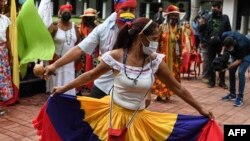Congolese rumba is among at least nine new entries on UNESCO’s “representative list of the intangible cultural heritage of humanity.”
UNESCO is making its 2021 designations this week, recognizing cultural heritage ranging from Arabic calligraphy to falconry to Nordic clinker boat traditions.
Congolese rumba was named to the list Tuesday. The Democratic Republic of Congo and the Republic of Congo jointly bid for UNESCO to recognize the music and dance, which helped energize people in those countries to shake off colonial rule by Belgium and France, respectively, in Congo, in 1960.
UNESCO’s director general, Audrey Azoulay, summarized rumba’s significance.
“In the 20th century, the Congolese rumba was a symbol for the fight for emancipation, dignity and political independence on the African continent,” she said in a statement shared with VOA. “Therefore, the inscription of this music is not just the recognition of a cultural practice but a historic decision. It underlines the political nature of this music, which inspires so many artists all around the world today.”
Through its ongoing list, UNESCO aims to safeguard cultural practices and ensure that they’re handed down through generations.
The list of new entries includes:
— Pasillo song and poetry from Ecuador.
— Pottery-related practices and knowledge of Peru’s Awajún people.
— Dances and other expression affiliated with Panama’s Corpus Christi festivities.
— Venezuela’s festive cycle around worship of St. John the Baptist.
— Bolivia’s Grand Festival of Tarija.






